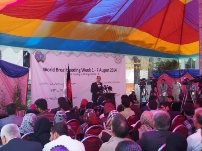 WHO Country Representative Dr Rik Peeperkorn addresses the audience and media during World Breastfeeding Week celebrationsKabul 5 August 2014 – Today the Ministry of Public Health, WHO and UNICEF celebrated World Breastfeeding Week in Kabul with the theme “Breastfeeding: A winning goal for life,” highlighting the link between breastfeeding and the achievement of the Millennium Development Goals (MDGs).
WHO Country Representative Dr Rik Peeperkorn addresses the audience and media during World Breastfeeding Week celebrationsKabul 5 August 2014 – Today the Ministry of Public Health, WHO and UNICEF celebrated World Breastfeeding Week in Kabul with the theme “Breastfeeding: A winning goal for life,” highlighting the link between breastfeeding and the achievement of the Millennium Development Goals (MDGs).
“The first step towards reducing the undernutrition of children is exclusive breastfeeding. It has been shown repeatedly to be the single most effective way to prevent infant deaths. Ultimately, breastfeeding saves lives,” says Dr Rik Peeperkorn, WHO Afghanistan Country Representative.
Early initiation and exclusive breastfeeding for at least six months is among the most effective interventions to protect children from common causes of death, including complications from prematurity, newborn infections, diarrhoea and pneumonia.
Dr Suraya Dalil, Minister of Public Health, emphasized the commitment of the Government of Afghanistan to reduce infant and child mortality. “The recently conducted National Nutrition Survey shows that 58% of children in Afghanistan are exclusively breastfed and 69% are breastfed within one hour of birth,” said Dr Dalil. “If every mother in Afghanistan were to initiate breastfeeding within one hour and practise exclusive breastfeeding for the first six months of a child’s life, this would prevent 32 000 deaths in children under five years of age per year.”
This year’s World Breasfeeding Week focuses on the MDG countdown process and the ways in which exclusive breastfeeding contributes to each of the Goals in a significant way. Achieving MDGs 4 and 5 on reducing child mortality and improving maternal health require more early, exclusive and continued breastfeeding. Similarly, exclusive breastfeeding and continued breastfeeding for two years and beyond provide high quality nutrients and adequate energy, and can help prevent hunger and malnutrition, contributing to MDG 1 on eradicating extreme poverty.
Breastfeeding not only benefits children but also matters for mothers’ health and well-being. It empowers women by enabling them to be in control of their reproductive lives. Mothers’ risk of postpartum haemorrhage is reduced by starting breastfeeding early. Breastfeeding also protects against anaemia and maternal iron depletion, and reduces the risk of breast and ovarian cancers, as well as diabetes.
Globally, newborn deaths represent 44% of all child deaths under five years. Of all the known life-saving interventions for infants across the world, breastfeeding has the most impact and is the most cost-effective. WHO is committed to continuing its efforts to promote breastfeeding in Afghanistan and providing technical support to the Ministry of Public Health to further improve the health of children and mothers around the country.



